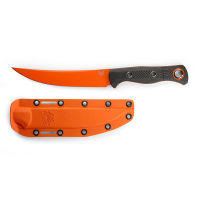
A well-stocked pantry is the key to a successful dinner, especially when you don’t have a game plan or a recipe. With the right ingredients, you can cook creative meals on the fly using only the ingredients you have on hand. We like to call this freestyle cooking. To make things easy, here’s a list of ten pantry items every wild game cook should have in stock.
Kosher Salt
Salt is the most important ingredient in your pantry. It makes meat flavorful and juicy. If you don’t believe me, check out my article about brining wild game. Kosher salt, as well as sea salt, is a workhorse in my kitchen. I use it in my sausage recipes, brines, and for boiling pasta. My pantry is never without a box or two. If sea salt is already part of your repertoire, try sprinkling on some Maldon’s flaky salt just before eating your next wild game dinner. It’ll prove that not all salt is created equal.
Breadcrumbs, Cornmeal, or Flour
No house should be without the key ingredient necessary for a good ol’ fry. The choice between breadcrumbs, cornmeal, or just plain flour can be debated. While some have a preference, folks like Ryan Callahan and Spencer Neuharth tend to reach for whatever is available.
“I don’t do much baking or have an affinity for pancakes, but I always have flour on hand,” Spencer said. “It’s good for a bunch of applications, like thickening a sauce or soup, and is serviceable for breading fish, turkey, and venison. No matter what you use, take Chef Jesse Griffiths’ advice and season your meat independent of the flour. Spices take hold better if you directly apply them to the meat rather than tossing them with breading.”
High Smoke Point Cooking Oil
Speaking of frying, no kitchen should be without oil. If I could only have one kind for the rest of time, it would need to be something with a high smoke point. This means the oil can get 400 degrees or higher without burning and smoking. I use these oils the most when cooking meat that needs to be browned or seared. Oils with a high smoke point include avocado, grapeseed, canola, peanut, sunflower, and clarified butter.
Essential Spices
There are many spice blends available that can simplify complicated recipes. You can use these instead of keeping dozens of spices that end up neglected. However, everyone should have a basic set that includes thyme, rosemary, oregano, cumin, and crushed red pepper. If you already have these spices and want to try something new, Spanish smoked paprika is an absolute winner.
Vinegar
Like salt, acids can have a strong effect on meat. Vinegar assists in the breakdown of protein when braising meat. An excellent example is my balsamic braised venison roast. Vinegar plays an essential role in taste; you need acidity to balance out other flavors. Wild game is often dark and rich, but acidity cuts right through that and makes a dish come alive. The most versatile kinds of vinegar are white and red wine, but in a pinch you can always grab a jar of pickles and use the juice instead.
Dried Mushrooms
Mushrooms and wild game share an earthy, aromatic compound that make them a highly compatible food pairing. I don’t always have fresh mushrooms on hand, so I keep a jar of dried shiitakes or porcinis in the pantry. When dried, the flavors concentrate and intensify.
There are two ways to utilize them. You can pulverize them in a spice grinder to add umami flavors to spices. Or, reconstitute them with hot water for cooking; the bonus is that you create a mushroom flavored broth. If you forage for morels this spring, I encourage you to save some to dehydrate. You’ll be happy to have them year-round.
Canned Tomatoes
If you love eating wild game spaghetti at home, you should stock up on canned tomatoes. Once you make the sauce using whole peeled or crushed tomatoes, you’ll never go back to the premade stuff again. The flavors aren’t even comparable. With that said, I also like having cans of tomato paste and diced tomatoes in my pantry. There are endless uses for both, like chili, stews, sloppy joes, and venison tacos.
Stock
Many of us make our own wild game stock, but it often doesn’t last long. During the winter months I find myself making a lot of stews or braises and run out of venison broth. That’s when I resort to buying it at the store. I always have a couple boxes of beef and chicken stock in the pantry. They’re also good for adding flavor to grains when cooking, something that can take a worn-out recipe to the next level.
Mustard
I’m sure everyone has mustard in the fridge. This versatile condiment can do more than just compliment a sandwich, though. You can boost your traditional pot roast by adding a big dollop into the pot or use it to diversify your tried-and-true marinade. Mustard fills a unique niche that makes it a must-have.
Soy Sauce
I don’t think there are any instances where I don’t like soy sauce with wild game. It provides salt and savory umami flavors to meat, and is a no brainer when making marinades and jerky. My favorite kind is ponzu sauce, which is a tangy blend of soy sauce and citrus fruits. You can buy it pre-made at the store or make it at home yourself. Give it a try using Lukas Leaf’s Venison Tataki with Ponzu recipe.
Spices for Thought
While these ten items aren’t exactly the definition of essential, they make life easier in the kitchen. The next time you’re at the grocery store, try picking up a few of these ingredients and look for something you haven’t tried before. Hunters and anglers have diverse freezers, so their pantries should reflect that.







